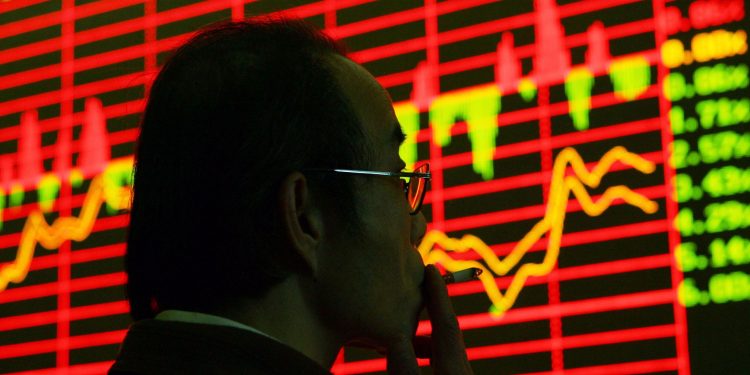Shang-Jin Wei
Chinese firms are more enthusiastic than most about listing on US stock exchanges. Currently, 250 companies, including those that are registered in Hong Kong or offshore centers but derive most of their revenue and profits from mainland China, trade on US equity markets. But a recent flurry of official measures in both China and the United States suggests that the two governments are not keen on Chinese firms retaining their US listings. If push comes to shove, how would delisting hurt either country?
The latest controversy concerns the dominant Chinese ride-hailing platform Didi Global (partly owned by Uber), which on June 30 raised $4.4 billion in a successful IPO on the New York Stock Exchange. Within 48 hours, the Cyberspace Administration of China (CAC), citing a suspected data-security breach, announced that it would restrict the company’s ability to sign up new users. The CAC then ordered the removal of Didi from all domestic Chinese app stores, and the State Administration of Market Regulation, the country’s antitrust authority, fined the firm for not obtaining prior approval for earlier mergers and acquisitions.
The penalties imposed on Didi – widely interpreted as a warning to other Chinese companies against listing in the US without government approval – partly reflect three concerns among Chinese policymakers. The authorities are worried that sensitive digital data, including the location of (and traffic flows around) important addresses in China, may fall into the hands of the US intelligence or Defense communities. They also do not want Chinese technology firms to become too large and powerful, and fear that Big Tech companies’ forays into financial markets may undermine financial stability.
I suspect that the Chinese authorities have a fourth reason: to reduce US leverage. In the last days of his administration, President Donald Trump signed America’s Holding Foreign Companies Accountable Act. The new law authorises the delisting of Chinese companies from US stock exchanges if China fails to allow the US Public Company Accounting Oversight Board (PCAOB) to obtain the underlying worksheets of these firms’ auditors after three consecutive years. And on June 22, the US Senate passed another Bill that could bring delisting forward by one year.
If the US has the option of delisting Chinese firms en masse and in a disorderly manner at a time of its choosing, it could potentially use it to generate financial and economic instability in China. The Chinese authorities may, therefore, find it prudent to reduce or eliminate this vulnerability.
US lawmakers’ ostensible reason for threatening to delist Chinese companies is to protect American investors from potential accounting frauds such as the one committed by Luckin Coffee last year. But US investors have lost much more money as a result of accounting scandals at US companies such as Enron, WorldCom, HealthSouth, Freddie Mac, American International Group, and Lehman Brothers, some of which took place after the PCAOB was established. Moreover, Chinese firms’ most egregious accounting frauds tend to be discovered by professional short-sellers using techniques – such as undercover company visits – that auditing firms do not employ.
Chinese authorities once tacitly encouraged US listings, viewing them as a symbol of China’s embrace of the global capital market. Many Chinese technology firms also had little alternative to listing in the US before 2018. But the situation today is different.
Previously, many Chinese firms chose to list in New York instead of Shanghai or Shenzhen because their foreign private-equity or venture-capital investors wanted to avoid China’s foreign-exchange controls. Moreover, China has much tougher listing requirements and a long and uncertain waiting period for regulatory approval. For example, Amazon and Facebook would not have been allowed to list in China at the time of their US IPOs because they did not have the requisite profits.
Similarly, although Hong Kong imposes no capital controls, it also had stricter listing requirements than the US until 2018. In particular, while the US allows different classes of shares to have different voting rights – as is the case with Alibaba and Didi, for example – Hong Kong required voting rights and financial stakes to be exactly aligned. Most countries regard a divergence between voting rights and cash-flow rights as facilitating bad corporate governance, because it potentially allows controlling shareholders to enrich themselves through self-dealing at the expense of other investors.
But after seeing so many Chinese companies choosing New York, the Hong Kong Stock Exchange decided to allow US-style multiple share classes for technology and life-sciences firms. More Chinese firms have since listed in Hong Kong, or have a dual listing there and in New York. Tencent, China’s biggest social-media company, was first traded in Hong Kong before adding a secondary listing in New York, and currently commands a higher price-to-earnings multiple than Facebook, its closest US counterpart.
This suggests that the effects of delisting US-traded Chinese firms may be manageable for both China and America. China, as a high-savings country and a net exporter of capital, does not need US listings of its companies to import more capital. And while some firms’ founders and initial investors may experience a valuation haircut in their IPOs, this does not pose a major challenge to the Chinese government.
Similarly, most US hedge funds, mutual funds, and rich individuals will still be able to invest in Chinese firms listed in Hong Kong, and even – albeit less conveniently and straightforwardly – those listed in mainland China. True, delisting profitable and fast-growing Chinese companies may reduce returns for many middle-class US households whose pension funds are restricted to investing only in US-listed securities, and US stock exchanges will lose business. As ordinary Americans would not connect lower returns on their pension funds to delisting of Chinese firms, US politicians are unlikely to face a backlash. And that fact could make delistings more likely.
The writer, a former chief economist at the Asian Development Bank, is Professor of Finance and Economics at Columbia Business School and Columbia University’s School of International and Public Affairs. ©Project Syndicate






































